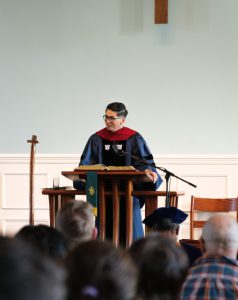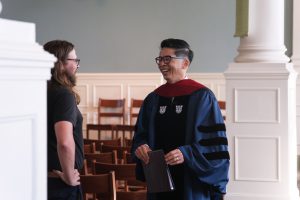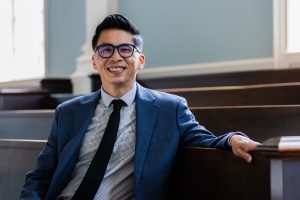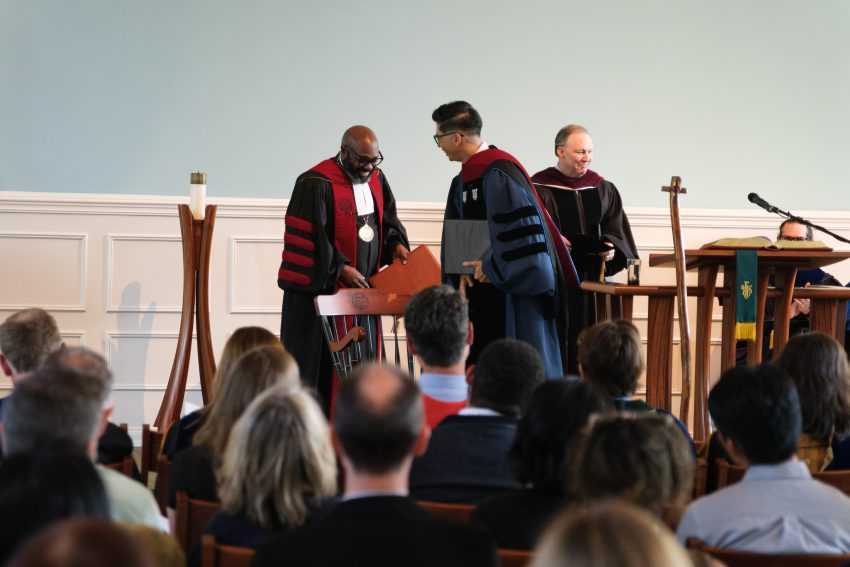On Oct. 2, 2025, the Rev. Dr. Kenneth J. Woo was installed into the P. C. Rossin Chair of Church History and Historical Theology at Pittsburgh Theological Seminary. Below are excerpts of his inaugural lecture, “Theological Imagination, a Poet in Exile, and Calvin as Interpreter of the Psalms.” These lecture points are more fully fleshed out in Dr. Woo’s upcoming book, John Calvin, Refugee Theologian (Baker Academic), which will be available Dec. 16, 2025.
Peter C. Rossin was chairman and chief executive officer of Dynamet Inc., which he founded in 1967. During his professional career, Rossin served as director of several public and private companies. He was a graduate of Lehigh and Yale universities. Mr. Rossin and his wife, Ada—longtime members of Westminster Presbyterian Church in Upper St. Clair, Pa.—shared a commitment to the effective education of future generations and, specifically, to the upholding of moral, social, and professional ethics. The chair was endowed by the Rossins in 1991.
Awareness of History for Effective Pastoral Ministry
 Dr. Woo asserts the importance of historical awareness for the ongoing life of the Church—for understanding identity, for effective pastoral care, and to ground and fuel theological imagination. Though today John Calvin is often known merely or foremost as “the predestination guy,” Dr. Woo draws forward Calvin’s ministry context—an exiled religious refugee ministering to fellow exiles and religious refugees—and notes the way Calvin leans on Scripture to interpret his situation and to minister effectively to those under his care in difficult circumstances.
Dr. Woo asserts the importance of historical awareness for the ongoing life of the Church—for understanding identity, for effective pastoral care, and to ground and fuel theological imagination. Though today John Calvin is often known merely or foremost as “the predestination guy,” Dr. Woo draws forward Calvin’s ministry context—an exiled religious refugee ministering to fellow exiles and religious refugees—and notes the way Calvin leans on Scripture to interpret his situation and to minister effectively to those under his care in difficult circumstances.
“Memory is an essential element of identity, but it also stimulates imagination . . . . What’s often under-appreciated is how [the] work of the pastor-as-historian is not just about rigorous interrogation of past and present contexts. It demands considerable powers of imagination to make connections both careful and creative.”
“My interest in how Calvin sought to shape the theological imaginations of his contemporaries has centered on the experience of political exile as an expression of spiritual exile. How did Calvin apply the theme of exile, with which the pages of Scripture abound, to his era of persecution and displacement? The answer is liberally.”
“Calvin’s was a world on the move . . . . This both shaped the questions Calvin brought to Scripture and the comfort he found there for believers in an age of migration and violence. David’s story located both political exiles and others who never left home within a larger spiritual reality: the present life as a wilderness journey in which God sustains God’s people with manna in the wilderness.”
Reclaiming Calvin as a Relatable Person, Not a One-Dimensional Character
 Many today see Calvin as either friend or foe and his work as either an obstacle in or tool for their ministries. Dr. Woo pushes back on tired, oversimplified portraits of the reformer, claiming that a fuller understanding of Calvin’s personhood and story offers us rich resources: opportunities to cultivate dialogue, a capacity to listen generously, and an open door for marginalized communities to engage Calvin’s work as a resource rather than a source of exclusion.
Many today see Calvin as either friend or foe and his work as either an obstacle in or tool for their ministries. Dr. Woo pushes back on tired, oversimplified portraits of the reformer, claiming that a fuller understanding of Calvin’s personhood and story offers us rich resources: opportunities to cultivate dialogue, a capacity to listen generously, and an open door for marginalized communities to engage Calvin’s work as a resource rather than a source of exclusion.
“Behind our stereotyped villains and heroes, rigorous historical study can uncover more complex, conflicted, and—dare we say—human, relatable, and catholic figures. Such portraits challenge confirmation bias and introduce us—whatever we might have thought—to people from whom we might learn something. This, dare I say, is a kind of critical generosity toward others that makes us better listeners and friends in general.
“Reading Calvin as refugee theologian today similarly invites us to reassess our traditions. Here, I suggest the opportunity is not to center Calvin himself, but rather to consider how his exilic status offers a bridge for previously marginalized voices to engage the Reformed faith with an overdue sense of belonging . . . to embrace this rich and complex theological heritage as their own, rather than as outsiders.”
“The counterintuitive proposal of Calvinism as ‘refugee theology’ creates opportunities for cultivating dialogue at time when North American society and churches are riven anew by fractured public discourse and ethnic suspicion.”
Finally, Dr. Woo says, “I am grateful and humbled by the trust you place in me—child of immigrants, who came into Christianity from a non-practicing home—to uncover our tradition’s riches with you all at Pittsburgh Theological Seminary.”
Dr. Woo’s book is available for pre-order through Baker Academic.
 The Rev. Dr. Kenneth J. Woo began teaching at Pittsburgh Theological Seminary in 2016. He has taught at Duke Divinity School, Redeemer Seminary, and the College of New Jersey. He has also served as a faculty member in the United Methodist Church Course of Study program for ordained ministry. Dr. Woo received his Th.D. in the history of Christianity (Reformation Studies) from Duke University in 2015. Before that he completed his M.Div. at Westminster Theological Seminary and B.A. at the College of William and Mary. Dr. Woo’s first book—Nicodemism and the English Calvin, 1544-1584 (Brill, 2019)—examines the complex ways in which John Calvin and his followers employed theological polemics against religious dissimulation to establish and enforce social and ecclesial boundaries in a variety of 16th century contexts. His next book, John Calvin, Refugee Theologian, will be published by Baker Academic. Beyond the European reformations, Dr. Woo’s research interests span the development of the Reformed tradition, the intersection of biblical interpretation and church history, and historical religious responses to persecution and mass migration. His work has appeared in Harvard Theological Review, Church History and Religious Culture, Concordia Theological Quarterly, Reformation and Renaissance Review, Interpretation, Theology Today, and Sixteenth Century Journal, as well as in volumes published by Oxford University Press and Cambridge University Press. A minister of the Reformed Church in America (RCA), Dr. Woo has served churches in New Jersey, Virginia, and North Carolina, as well as several years in campus ministry. He served for six years as pastor of a multicultural congregation near Washington, D.C. Dr. Woo currently chairs the candidates committee of his classis, which oversees the progress of individuals pursuing ordination in the RCA. He is a member of the Association of Asian/North American Theological Educators (AANATE) and a trustee of the Foundation for Theological Education in Asia and the Pacific (FTEAP). Since 2019 he has been a trustee and secretary-treasurer of the Calvin Studies Society.
The Rev. Dr. Kenneth J. Woo began teaching at Pittsburgh Theological Seminary in 2016. He has taught at Duke Divinity School, Redeemer Seminary, and the College of New Jersey. He has also served as a faculty member in the United Methodist Church Course of Study program for ordained ministry. Dr. Woo received his Th.D. in the history of Christianity (Reformation Studies) from Duke University in 2015. Before that he completed his M.Div. at Westminster Theological Seminary and B.A. at the College of William and Mary. Dr. Woo’s first book—Nicodemism and the English Calvin, 1544-1584 (Brill, 2019)—examines the complex ways in which John Calvin and his followers employed theological polemics against religious dissimulation to establish and enforce social and ecclesial boundaries in a variety of 16th century contexts. His next book, John Calvin, Refugee Theologian, will be published by Baker Academic. Beyond the European reformations, Dr. Woo’s research interests span the development of the Reformed tradition, the intersection of biblical interpretation and church history, and historical religious responses to persecution and mass migration. His work has appeared in Harvard Theological Review, Church History and Religious Culture, Concordia Theological Quarterly, Reformation and Renaissance Review, Interpretation, Theology Today, and Sixteenth Century Journal, as well as in volumes published by Oxford University Press and Cambridge University Press. A minister of the Reformed Church in America (RCA), Dr. Woo has served churches in New Jersey, Virginia, and North Carolina, as well as several years in campus ministry. He served for six years as pastor of a multicultural congregation near Washington, D.C. Dr. Woo currently chairs the candidates committee of his classis, which oversees the progress of individuals pursuing ordination in the RCA. He is a member of the Association of Asian/North American Theological Educators (AANATE) and a trustee of the Foundation for Theological Education in Asia and the Pacific (FTEAP). Since 2019 he has been a trustee and secretary-treasurer of the Calvin Studies Society.


1 thought on “Theological Imagination, a Poet in Exile, and Calvin as Interpreter of the Psalms”